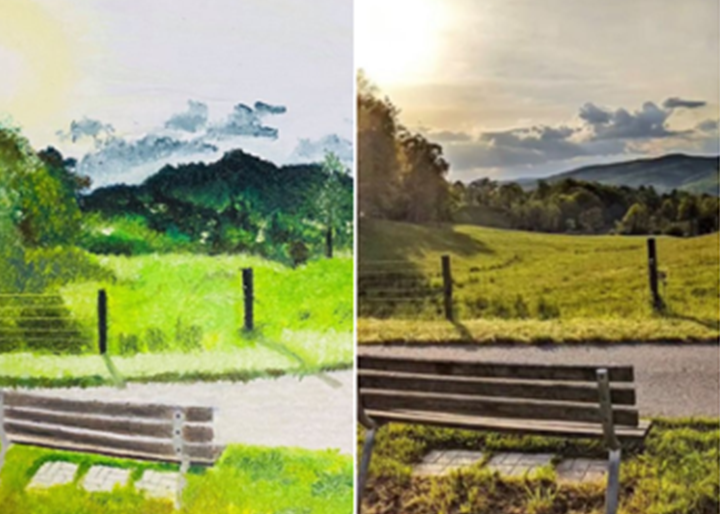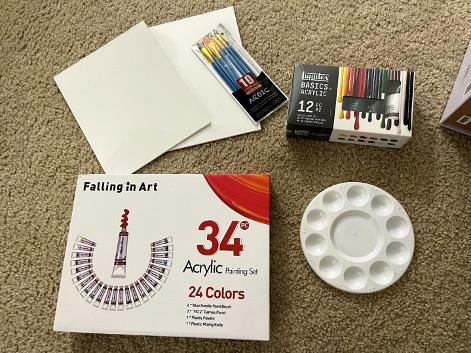Using Art to De-Stress in a Global Pandemic
June 15, 2021

Shortly after the COVID-19 pandemic began in March 2020, Siddhee Anand Sahasrabudhe and other University of Minnesota students saw a post from the Community Health Improvement Partnership (CHIP) on the Hennepin County website. CHIP focuses on improving housing stability as well as improving mental wellbeing. In the post, CHIP presented an opportunity for community members to submit a grant application for a community-based, grassroot level, engagement idea. A selected application would receive a grant of $300 to $500 to fund their idea.
Sahasrabudhe, Pooja Hegde, and Nishank Varshney, all of whom are graduate students at the University of Minnesota and live in an apartment complex near the University, decided to apply.
“The application for the community-level project idea that we had submitted for this particular application was quite unique,” said Sahasrabudhe. The pandemic had just begun, and was taking a large emotional and financial toll on the students who live in their building. Many of the residents had lost their jobs, were no longer able to go on campus, could not visit their families or friends, and were feeling extreme levels of stress and isolation. As a means to “give them a creative escape from all the chaos that was going around,” they proposed hosting an event to “de-stress with art.”
The goal of this event was to, “provide an avenue where people can just take their minds off for some time and just come together on Zoom while still being physically distant, yet still having that sense that all of us are in this together,” said Sahasrabudhe.
Before the event, the organizers sent out a survey to the residents in their building with different options for supplies that would be provided to interested parties, including paints, crayons, and canvases. Of the 300 total residents, 52 responded that they were interested in participating in the de-stress event.
“It is a great way to de-stress. I love painting and this is the perfect way to get a chance to do that… It is also a great way to participate in an event without stepping out of the apartment and while maintaining social distancing so that you are sure that you are safe and the others are, too."
With high interest in the event, however, the group was challenged with purchasing supplies. In order to provide meaningful supply kits, they would need to spend $10 to $15 per participant, which was not possible with only the $500 grant from CHIP. They thought they would have to reduce the amount of participants or the supplies participants would receive in order to stay within budget.

However, they received another $275 in funding from their apartment complex. The group pitched the “de-stress with art” event to the complex’s board of directors, which provides funding for community-building activities. With this additional funding, the group had $775 to put toward supplies for 52 participants.
After purchasing and distributing meaningful supply kits, the organizers hosted a meeting for the event on Zoom. Some participants had already completed their projects and showed their artwork to others, while some began their paintings and worked synchronously.
Following the event, the organizers received feedback from the participants, many of whom liked that they were given art supplies and were able to attend a synchronous Zoom session where they could have company while painting.
One participant said, “It is a great way to de-stress. I love painting and this is the perfect way to get a chance to do that without worrying about art supplies. It is also a great way to participate in an event without stepping out of the apartment and while maintaining social distancing so that you are sure that you are safe and the others are, too.”
Prior to this event, the organizers had only hosted small-scale events in person. Through the process of planning the de-stress event, they learned how to adapt to barriers caused by the pandemic. Furthermore, they learned the importance of bringing people together so that the community could still be engaged and feel like they are together.
“We learned that even through small initiatives, we have to make an attempt to bring people together on an online platform. All of that effort is worth it because we are facing unprecedented and difficult times, and people need our support in every shape and form to fight isolation and stress,” said Sahasrabudhe. “I think that all of the small activities and all of that effort pays off because of the continuous impact it has for the community.”
After the event, participants shared possible future events that they would like to participate in, such as a book club, baking event, or a 5K run. A small-scale free library has been started at the apartment complex with donated books, and the organizers are planning to organize more events to further support their community.